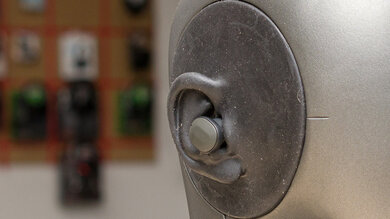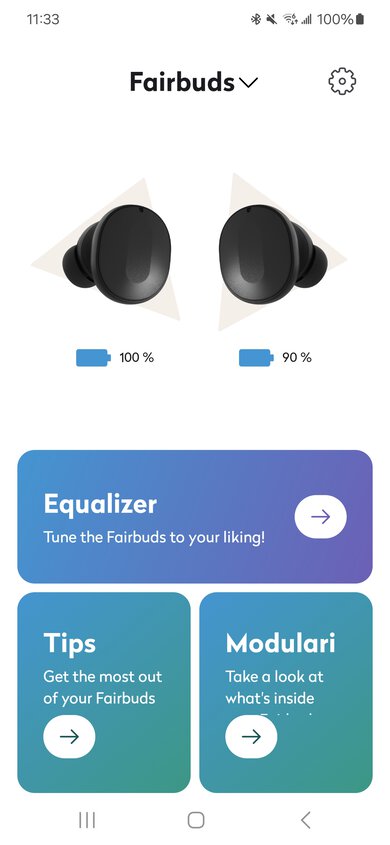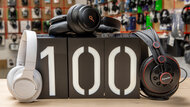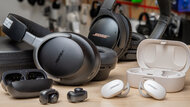The Fairphone Fairbuds True Wireless are eco-conscious earbuds with a repairable design. You can even replace the batteries, which wasn't possible with Fairphone's previous venture into repairable earbuds, the Fairphone True Wireless Stereo Earbuds. Fairphone sells the replacement parts, and if you're comfortable with a Philips head screwdriver and pushing in a couple of connectors, you can even do the work yourself.
The Fairphone team are committed to their project: these buds come with a two-year warranty with an extra year if you register online. But while an eco-conscious design is to be welcomed, how do the buds actually sound? Read on to find out.
Our Verdict
The Fairphone Fairbuds are mediocre for neutral sound. They have a warm sound that fans of genres like soul and R'n'B will appreciate, though a boost in the high-bass and low-mids means they can sound a touch cluttered at times. Still, their mid-range represents instruments accurately and with enough detail. On the other hand, the treble region is both recessed and uneven. Vocals lack presence and detail, while cymbal sounds can be harsh or piercing depending on their pitch. That said, you can tweak their sound to your liking using their companion app's graphic EQ and presets.
-
Outstanding frequency response consistency.
-
Mediocre Bluetooth connectivity.
The Fairphone Fairbuds are good for commuting and travel. They do a superb job blocking out everything from the sound of plane engines to pedestrian street chatter. They're easy to toss in a pocket or bag, and even if you like to listen loud, you won't disturb anyone around you with your audio. On the other hand, while they have a stable fit, they're only decently comfortable, and it's easy to accidentally input the wrong swipe gesture command when using them in a hurry. Their roughly five-hour battery life also won't be enough to get you through a long flight without recharging.
-
Don't leak much audio.
-
Superb noise isolation.
-
Stable fit.
-
Mediocre Bluetooth connectivity.
-
Poor continuous battery life.
The Fairphone Fairbuds are very good for sports and fitness. They're comfortable, have a solid build quality, and have good controls. Once you get a good fit, they'll stay on for moderately intense workouts like a park run, and their IP54 certification means you can get them damp and sweaty without worrying about breaking them. Unfortunately, they have a poor battery life of roughly five hours. While that will see you through most workouts without recharging, if you like going on all-day hikes or marathon runs, these aren't the buds for you.
-
Don't leak much audio.
-
Superb noise isolation.
-
Stable fit.
-
Mediocre Bluetooth connectivity.
-
Poor continuous battery life.
The Fairphone Fairbuds are okay for office use. They don't leak much audio, so you can blast your favorite tunes without disturbing anyone around you. They also do a remarkably good job blocking out the ambient sounds of an office like people chatting or typing, so they'll prove useful when you need to focus on your work. Unfortunately, while they're comfortable enough to wear for a long day at the office, they only last five hours continuously, so you'll need to recharge mid-way through your work. Even though they have multi-device pairing, their Bluetooth connectivity is only passable, and we experienced connection issues when using them with our PC.
-
Don't leak much audio.
-
Superb noise isolation.
-
Mediocre Bluetooth connectivity.
-
Poor continuous battery life.
The Fairphone Fairbuds aren't suitable for wireless gaming. You can connect them to your PC or phone via Bluetooth, but their latency is too high to be viable for wireless gaming.
The Fairphone Fairbuds aren't suitable for wired gaming because they can only be used wirelessly.
The Fairphone Fairbuds aren't the best choice for phone calls. We were unable to fully test their microphone using our rig, but we were able to test the mic's ability to separate your voice from background noise, and it fared poorly. That said, the buds do a great job blocking out noise around you, so even if you're in a busy area, you'll be able to hear what is being said to you, though whoever you're talking to will have a harder time understanding you. The buds also have mediocre Bluetooth connectivity, so expect frequent disconnects if you plan to stray more than a meter away from your phone or PC while wearing these.
-
Superb noise isolation.
-
Mediocre Bluetooth connectivity.
-
Bad microphone noise handling.
- 6.4 Neutral Sound
- 7.7 Commute/Travel
- 8.0 Sports/Fitness
- 6.6 Office
- 4.6 Wireless Gaming
- 4.5 Wired Gaming
- 3.8 Phone Calls
Changelog
- Updated Oct 23, 2024: Review published.
- Updated Sep 10, 2024: Early access published.
- Updated Aug 28, 2024: Our testers have started testing this product.
- Updated Aug 08, 2024: The product has arrived in our lab, and our testers will start evaluating it soon.
- Updated Jul 24, 2024: We've purchased the product and are waiting for it to arrive in our lab.
Check Price
Differences Between Sizes And Variants
The Fairphone Fairbuds True Wireless come in two color variants: 'Black' and 'White.' We tested the 'Black' variant but expect other variants to perform similarly. This is our model's label.
If you encounter a different variant, please let us know in the comments, and we'll update our review.
Popular Headphones Comparisons
In terms of officially repairable earbuds, the Fairphone Fairbuds True Wireless stand out among those we've tested. Their real-world noise isolation performs similarly to the superb active noise cancellation (ANC) found on the Jabra Elite 8 Active Gen 2 True Wireless. If you're looking for earbuds that perform similarly to the Fairphone in many categories but at a cheaper price point, the Skullcandy Sesh ANC True Wireless are worth considering. Of course, you then lose the repairability. That said, some earbuds are more repairable than others. Websites like iFixit can get you started, but keep in mind that tampering with your headphones may void your warranty.
If you're an eco-conscious consumer who's not set on earbuds, the Fairphone Fairbuds XL Wireless are a good choice. The Fairbuds XL are over-ears but are also built out of easily repairable components and recycled materials. In the world of over-ears, the Dyson OnTrac Wireless also feature a degree of component customizability.
Check out our recommendations for the best wireless Bluetooth earbuds, the best noise cancelling earbuds, and the best wireless earbuds for Android.
The Fairphone Fairbuds and Sony WF-1000XM3 Truly Wireless are both a good choice for users who value repairability. The main difference is that Fairphone officially support customers repairing and replacing parts. By contrast, an informal community of people interested in repairability have deemed the Sony an unusually user-fixable set of buds, but Sony doesn't officially support this. Both pairs are well-matched for most use cases, though the Sony do have a noticeably better microphone. Still, the Fairphone are newer and have a more stable fit, so if you're concerned about your environmental footprint, they're the pair to choose.
The Fairphone Fairbuds and the Fairphone Fairbuds XL are both built out of easily repairable components and recycled materials. Both have great noise isolation. The choice comes down to your use case: the Fairbuds XL are over-ears and can be used wired, while the Fairbuds are small, portable earbuds that will still be comfortable during moderate exercise.
The Jabra Elite 8 Active Gen 2 are better headphones for most people than the Fairphone Fairbuds. The Jabra have a better mic, have longer battery life, and are more stable. That said, the Fairphone's real-world noise isolation is about as good as the Jabra's. So, if you're annoyed that consumer companies don't make repairable earbuds but also value superb noise isolation performance, the Fairphone are a good choice. And if they break, most of the Fairphone parts are user-replaceable, including the batteries.

We've upgraded our Headphones Test Bench to 2.0! This update brings several key changes to our tests and usages, making it easier than ever to interpret our sound results based on your personal preferences. You'll also find a brand-new interactive graph tool featuring multiple targets (including our own!) for you to explore and compare.
For a full breakdown, check out our changelog, which includes detailed commentary from our test designer explaining the rationale behind our update.
We'd also love to hear your thoughts: your feedback helps us keep improving, so join us in the comments!
Test Results
The Fairphone Fairbuds are in-ear headphones that are built to be repairable. They are made of monochromatic recycled plastic with matching silicone tips and come in 'Black' and 'White' models. We tested the 'Black' version, and the only flash of color in the design is the L and R printed onto each earbud to distinguish left from right. The bodies of each bud are large ovals with a touch-sensitive surface for entering commands. You can repair or exchange each earbud, the silicone earbud tips, the silicone ring, the charging case outer shell, the charging case core, and the batteries in the earbuds and charging case.
These earbuds are decently comfortable. They come with three different sizes of ear tips that will fit a wide variety of ear canals. The rounded edges of the buds also reduce overall ear fatigue, although they can still be a bit tiring to wear for more than an hour. Unfortunately, it's easy to break the buds' seal with your ear by using their touch controls.
The Fairphone Fairbuds have a good control scheme. Most of the controls are duplicated on each earbud, so you can easily access them with either hand. The control scheme is fairly intuitive, making use of gestures such as a swipe up to increase volume, which should make it less likely you'll skip a track when you mean to turn up the volume. Unfortunately, the buds can often misread your inputs, especially when using swipe gestures. For example, if the buds aren't oriented in the correct way in your ear, then your swipe up might be registered as a swipe across. They play a short tone when you input a tap command, which can be a little confusing as you don't receive any feedback until after the command is complete. You'll also hear short voice confirmations for things like turning on ANC or updating their paired devices, which is handy.
The Fairphone Fairbuds have a great case. It's made of premium-feeling, slightly translucent black plastic and will keep the buds secure while traveling. While on the larger side, it's still lightweight enough to throw in a pocket without too much hassle. You can pair the buds with new devices via Bluetooth by pressing the pairing button inside the case until its LED blinks in blue. You also charge the buds via the USB-C port on the case.
In true Fairphone fashion, you can replace the case's outer shell and inner core, as well as the case's 500 mAh battery. Changing the battery is as simple as removing a single assembly screw on the bottom.
The Fairphone Fairbuds have a good build quality. The buds and case are made from robust-feeling, dense plastic, and the silicone tips feel strong and tear-proof. The buds are rated IP54, so they're resistant to dust damage and water splashes. They're fine to take with you in the rain for a run.
As with the Fairphone Fairbuds XL Wireless, many of their parts are user-replaceable. You can purchase new parts from Fairphone's website or via useful links in the companion app. Some of the parts are also widely available, such as the replaceable LIR1054 battery cells in each earbud, which you can find in stores that sell rechargeable hearing aid batteries. The brand also demonstrates a commitment to sustainability in the materials used. They purchase metals such as cobalt, gold, and silver according to their own Fair Sourcing Principles and use recycled plastic and tin throughout the manufacturing process.
These earbuds have a good, stable fit. Their round design sits well in your concha, and most people will be able to get a good seal with one of the three sizes of silicone tips provided. Once you get a good seal, they'll stay in your ears unless you really start headbanging aggressively to your favorite Dream Theater tunes. It's worth noting that they stick out of your ears a little further than most earbuds, so take care when putting on hoodies or coats so the buds don't snag on them. Fairphone also sells silicone rings which can make the buds more stable and comfortable.
The Fairphone Fairbuds have a generally warm sound profile, without being bass-heavy. They lack a little mid-bass, so kick drums are robbed of some punch, but a boost across the high-bass and low-mids keeps basslines warm and full-feeling, though it can also make mixes sound a touch muddy. The mid-mids are fairly well-balanced, ensuring vocals and instruments are reproduced accurately, though a slight dip in the high-mids means they lose a little intensity. The treble region is recessed, which is what lends these their warm tonality. There's a huge dip in the low-treble that dulls vocals and pushes them to the back of busy mixes. The mid-treble, while also recessed relative to our target curve, is prominent relative to the low-treble, which can make sibilants like S and T sounds come across as a bit harsh.
The companion app has a few EQ presets to change the sound. Activating the ANC also changes the buds' sound profile slightly. If you turn on the microphone, the highest frequencies are shelved off, which can help you better hear what's being said to you, as you'll hear less high-pitched noise like fan whine.
These earbuds have superb frequency response consistency. If you take the time to get a good seal, you'll get consistent audio with each wear.
These earbuds have remarkable bass compliance. The low-bass is well-balanced, so mixes have plenty of thump, but a small dip in the mid-bass can rob kick drums of a little body and punch. A peak in the high-bass ensures basslines still sound full and warm but can also get a touch muddy.
The mid-range's target compliance is decent. The whole range is, for the most part, well-balanced, reproducing audio with detail and accuracy. The peak in the low-mids is a continuation of the peak in the high-bass and can make mixes sound a bit cluttered and muddy, but the response in the mid-mids is almost flat. A dip in the high-mids can push vocals to the back of dense mixes, but it's not a huge issue. In songs like Daddy Lessons by Beyonce, the lead vocals are present and detailed without ever getting honky or nasal.
These earbuds have terrible treble target compliance. A dip in the low-treble pushes vocals to the back of dense mixes, while a big peak in the mid-treble renders cymbal sounds slightly piercing relative to the recessed low-treble. In songs like Caribou's Bowls, the loud hi-hats that enter from time to time in the second half of the tune stand out from the mix a little too much.
The peaks and dips performance is okay. Overall, these headphones control their own sound profile well throughout the bass and mid-range regions but do a much worse job in the treble region. Sibilants like S and T sounds are rendered alternately harsh or piercing depending on their pitch.
These earbuds have an excellent imaging performance, which is in line with the great results we saw with the Fairphone Fairbuds XL Wireless. Taken together, these results suggest Fairphone have great quality control and ergonomics. Nonetheless, it's important to note that imaging varies between units, so these results are valid only for the units we've tested. In the case of the these buds, our unit's drivers are well-matched in group delay, amplitude, frequency, and phase response, so objects like voices are accurately placed in the stereo field. The soundstage doesn't feel artificially tilted to the left or right. The narrow peaks in the treble phase response are inaudible.
These earbuds have a terrible passive soundstage. This is to be expected from in-ears because their design means audio can't interact with your outer ear. The audio they produce lacks a sense of depth or width, and their soundstage feels closed off, as though it's coming from inside your head and not from two speakers in a room.
The Fairphone Fairbuds have good weighted harmonic distortion performance. In general, audio reproduction is pure and clean. A broad peak that starts in the mid-mids and rises up through the low-treble affects too many frequencies to be noticeable in most circumstances.
These are the settings used to test the Fairphone Fairbuds. Our results are only valid when using them in this configuration.
The Fairphone Fairbuds have great full-range noise isolation, thanks in large part to their ANC. They do a good job cutting down on bass-range sounds, like the rumble of a train engine, and mid-range sounds, like office chatter. They're not quite as amazing at blocking out trebly sounds, like fan whine, but they still do a decent job in this range.
These earbuds do a remarkable job of isolating you from everyday sounds. Whether blocking out the rumble of a plane engine or the ambient sounds of an office, these buds perform superbly. Even sharper sounds like car honks are greatly attenuated.
These earbuds don't have a wind mode to reduce the unwelcome noise created when gusts blow against the ANC microphones. Still, they performed quite well and don't produce too many artifacts.
The leakage performance is great. Audio that does escape is concentrated in the low-bass and mid-treble regions, so it will sound hollow and thin to anyone listening. You'll be able to blast your favorite Haken tunes without worrying about bothering people around you.
We are unable to test these earbuds' microphone with our testing rig. The microphone functions when used with a mobile device, but not when used with our testing rig PC. As a result, we were unable to take microphone frequency response measurements. However, by connecting the buds to a Samsung S22 phone, we were able to record the voice sample played back from our testing rig, which gives you an idea of how the microphone sounds, as well as how it handles noise. In general, the mic represents your voice adequately, but with a few artifacts.
These earbuds have poor microphone noise handling. While steady-state noise is significantly reduced, the buds achieve this at the cost of adding high-pitched artifacts to your recording. The noise gates also sound like they're a bit overactive: they often cut into the sound of your voice before you finish speaking. Even worse, when loud, rumbly background sounds are introduced, like a subway train going by, the microphone system is completely overwhelmed, making it impossible to understand anything you say.
These earbuds have a disappointing battery life. With ANC on, they last almost five hours continuously. Their case stores an extra four charges for a total of about 25 hours of playtime. On the plus side, they'll fully charge in less than an hour, and Fairphone says a 10-minute charge will generate 1.5 hours of continuous playback time. The 45 mAh batteries in both buds and the 500 mAh battery in the case are also user-replaceable, so you can buy a replacement if yours start to lose their ability to hold a charge.
The Fairphone Fairbuds come with a mediocre companion app. Here is a video of how it works. Like the Fairphone Fairbuds XL Wireless' app, it's a pretty barebones affair, though it's compatible with both Android and iOS. You can update the firmware and adjust a 5-band graphic EQ (or pick from some ready-made EQ presets). But other than that, the app acts like more of an instruction manual: it shows you how to repair the headphones, where to order replacement parts, and what the controls do, but you can't customize the controls to your liking. You're also unable to change ANC settings using the app. To toggle through the ANC modes, you have to press the tactile buttons on the buds themselves. It's worth noting that in addition to the regular noise cancellation, these buds include an 'Ambient Sound' mode which mixes in a little of the noise around you with your audio so you can better hear your surroundings.
You can't use these buds via a wired connection. Their case has a USB-C port for charging the buds, but they don't come with a charging cable.
The Fairphone Fairbuds have mediocre Bluetooth connectivity. They support multi-device pairing so you can remain connected to your phone and PC at the same time while using them. However, we experienced a variety of connection issues when using these buds. The buds' usable Bluetooth range varies depending on the device they are connected to, and sometimes even small obstacles, such as human hands, are enough to cause the buds to lose their connection with your device. As you'd expect, that means maintaining a stable connection to the buds is challenging, and you'll likely experience consistent disconnects. Have you experienced issues using these buds? If so, please let us know in the comments. We'd love to hear how other people have fared with these.
The buds also have extremely high latency. The SBC codec isn't known for its low-latency performance, but the Fairbuds perform particularly poorly on this front. In fact, our latency result was the best we were able to achieve: after several other tests, we measured even longer latency times. You'll definitely notice lip-sync issues with these when watching videos, and they're unsuitable for gaming. That said, different apps and devices compensate for latency in different ways, so your mileage may vary.
In theory, you can connect these headphones to Bluetooth-enabled PCs with full audio and microphone functionality. In practice, we experienced very poor connectivity performance when connecting these buds to PCs. Even a mild obstruction like a hand was enough to cause the connection to drop or disconnect entirely. Keep in mind that they don't support any other connection method to your PC.




























































































